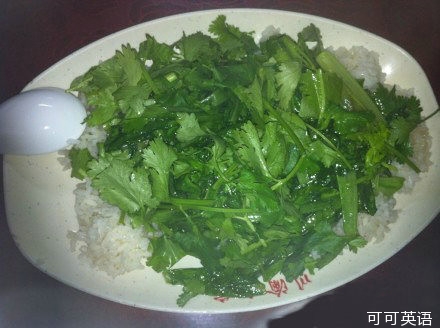
There's no question that cilantro is a polarizing herb. Some of us heap it onto salsas and soups with gusto while others avoid cilantro because it smells like soap and tastes like crushed bugs.
毋庸置疑,香菜受到了兩種最為極端的對待:喜歡它的人會把成堆的香菜放到沙拉和湯里,而討厭它的人卻覺得香菜聞著像肥皂,嘗起來像是在嚼臭蟲。
A large chunk of the US population—including the likes of culinary goddess Julia Child—have claimed that it tastes offensive. Kinda like soap, in fact. It spreads further than these shores, too: a recent survey suggested that 21 percent of east Asians, 17 percent of Europeans, and 14 percent of people of African descent all claim to be repulsed by the stuff.
包括著名廚師朱莉婭·查爾德在內(nèi)的許多美國人都不喜愛香菜散發(fā)出的肥皂一樣的味道。但實際上并非只有美國人這樣認(rèn)為,最近一項調(diào)查顯示,21%的東亞人、17%的歐洲人和14%的非洲人都說他們討厭這種蔬菜。
But what separates the cilantro lovers from the haters? Is it hard-wired in our genes, as Harold McGee suggested a few years ago in the New York Times? It's probably not so simple.
但為什么有人對香菜愛得要死,有人卻避之不及呢?是像食物專家哈洛德·麥基幾年前在《紐約時報》上撰文說的那樣,我們體內(nèi)的基因決定對香菜的喜好嗎?也許答案并沒有那么簡單。
Geneticists at 23andMe in California asked about 25,000 people whether they like cilantro or think it smells soapy. When they searched the people's DNA for regions that correlate with a distaste for the herb, a single spot jumped out. And, it sits right next to a cluster of odor-detecting genes, including one that is known to specifically recognize the soapy aromas in cilantro's bouquet.
位于加州的個人基因信息網(wǎng)站23andMe曾調(diào)查過25000人,問他們是否認(rèn)為香菜聞著像肥皂。當(dāng)網(wǎng)站的基因?qū)W家研究DNA,看是否有專門控制排斥香菜的基因位點時,他們找到了一個點,而且這個位點就在嗅覺檢驗基因簇的旁邊,將香菜的味道歸入肥皂味的基因也位于這個基因簇中。
The strongest variant lies within a cluster of olfactory-receptor genes—part of the genome which influences our sense of smell. Buried within that cluster is a gene called OR6A2, which encodes a receptor that makes people sensitive to the aldehyde chemicals contributing to cilantro's characteristic flavor.
在這簇嗅覺受體基因中,有一稱作OR6A2的最強變體,它負(fù)責(zé)編碼一種受體基因,能使人們對香菜特殊氣味的醛類物質(zhì)異常敏感。
But, "it didn't make a huge a difference in cilantro preference from person to person," Nicholas Eriksson, the lead author on the study says. In fact, their results suggest that a hatred for cilantro has only a small underlying genetic component. He and his team just published their findings on the arXiv.org.
不過該研究的主要作者尼古拉斯·埃里克森告訴記者:“個人對香菜的喜好和這個基因的關(guān)系并不大。”實際上,這個研究表明,基因組成只是某些人反感香菜的一小部分原因。埃里克森和他團隊的這一研究已經(jīng)發(fā)表在arXiv.org網(wǎng)站上。
The scientists pinpointed three more genes that influence our perception of cilantro: Two of the genes are involved with tasting bitter foods and one gene detects pungent compounds, like those in wasabi.
通過研究,這些科學(xué)家又指出三個影響我們對香菜接受度的基因。其中有兩個和品嘗苦味有關(guān),第三個和探測類似芥末的刺激性氣味有關(guān)。
Overall, Eriksson says these studies demonstrate that DNA does shape our opinion of cilantro, but probably not enough that we can't overcome it. "It isn't like your height, that you're stuck with. People can change it," he says.
總之,埃里克森認(rèn)為,雖然DNA的確會影響人們對香菜的好惡,但卻還在可控范圍內(nèi)。他說:“這并不像你的身高一樣,一旦定型就不可改變。我們還是可以改變對香菜的看法的。”
As Nature reports, McGee offers a strategy for building up an appreciation for the herb: Try a cilantro pesto. Crushing the leaves, he says, releases enzymes that convert the soapy, stinky compounds into more mild aromas.
根據(jù)《自然雜志》的報道,麥基為我們提供了一個接受香菜的食譜:香菜蒜香醬。把香菜的葉子搗碎,這樣香菜就能釋放出多種酶,把刺鼻的肥皂味變成更輕微的香氣。
But Julia Child, an avowed cilantro hater, said she would just pick it out and throw it on the floor, Nature reports.
不過《自然雜志》也報道,查爾德依然堅定地站在反對香菜的陣營里,她說她更愿意把香菜挑出來扔到地上。


